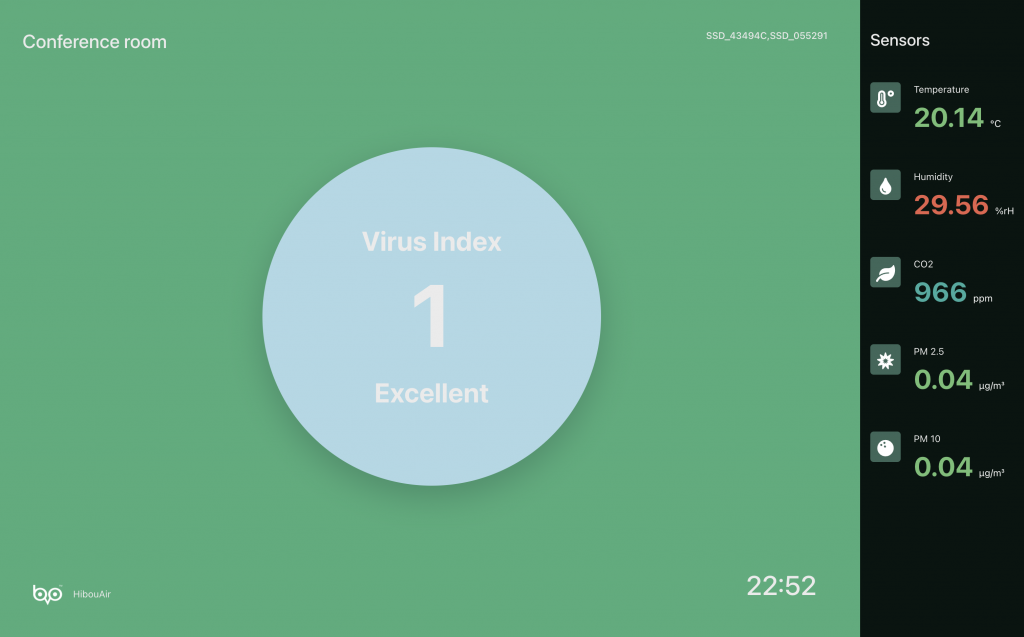Why Indoor Air Quality Monitoring is important in Healthcare needs
Hospitals and other healthcare facilities are supposed to be places of healing. Yet, surprisingly, indoor air quality can pose a significant health risk to patients, staff, and visitors. Here’s why understanding, mitigating and monitoring air quality is crucial in healthcare settings, along with the specific factors a monitoring system should track.
One of the primary concerns in hospitals is the spread of infections. Airborne pathogens, such as bacteria and viruses, can linger in the air, posing a significant risk of transmission from one person to another. Monitoring levels of particulate matter (PM) with sensors like those found in HibouAir, including PM1.0, PM2.5, and PM10, allows healthcare facilities to track and manage air quality effectively. By detecting and addressing elevated levels of PM, hospitals and other healthcare facilities can minimize the spread of infections and create a safer environment for all.
Additionally, carbon dioxide (CO2) levels play a crucial role in indoor air quality. High concentrations of CO2 can indicate poor ventilation, which can lead to discomfort, fatigue, and even cognitive impairment among occupants. Hospitals, with their high occupancy rates and stringent hygiene requirements, must maintain optimal ventilation to support patient recovery and staff performance. HibouAir’s CO2 sensor provides real-time and historical data on indoor air quality along with smart analytical report, enabling healthcare facilities to adjust ventilation systems as needed and ensure a constant supply of fresh, clean air.
Temperature and humidity levels also influence patient comfort and recovery. Extreme or lower temperatures , excessive humidity can exacerbate existing health conditions and impede the healing process. By monitoring these variables with precision, hospitals can create a comfortable and conducive environment for patient care. HibouAir’s comprehensive suite of sensors, including temperature and humidity monitoring capabilities, empowers healthcare facilities to maintain ideal conditions for patients and staff, promoting well-being and recovery.
Moreover, volatile organic compounds (VOCs) present another challenge in healthcare environments. These chemicals, emitted from various sources such as cleaning products, furnishings, and medical equipment, can contribute to indoor air pollution and pose health risks to occupants. HibouAir’s VOC sensor allows hospitals to detect and mitigate harmful compounds, ensuring a healthier indoor environment for everyone.

Furthermore, HibouAir’s smart analytical dashboard includes smart AI based Virus Index feature, which provides real-time insights into the risk of virus spreading based on environmental parameters. This cutting-edge functionality enables healthcare facilities to proactively assess and mitigate the risk of viral transmission within their premises. By monitoring factors such as humidity, temperature, CO2 and airborne particulate matter, the Virus Index offers a comprehensive overview of the environmental conditions conducive to viral spread. With this valuable tool at their disposal, hospitals can take swift and targeted actions to minimize the risk of infections, ensuring a safer and healthier environment for patients, staff, and visitors alike.
The importance of air quality monitoring in healthcare settings cannot be overstated. By leveraging advanced sensor technology like that offered by HibouAir, hospitals can safeguard the health and well-being of their patients and staff. From controlling the spread of infections to maintaining optimal indoor conditions, comprehensive air quality monitoring is essential for enhancing healthcare standards and ensuring the best possible outcomes for all.

